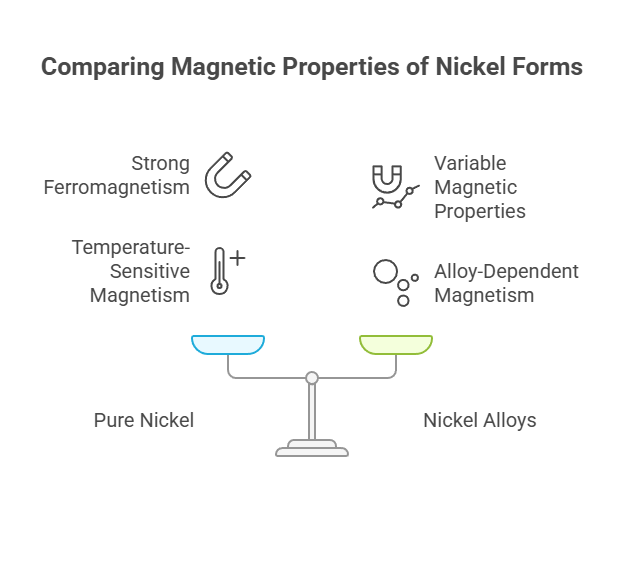Pure nickel, especially in commercially available forms like Nickel 200 and Nickel 201, exhibits **ferromagnetic** properties. This means that under normal conditions, pure nickel is magnetic — it can be attracted by magnets and can itself become magnetized. However, the degree of magnetism depends on several factors including purity, temperature, and mechanical processing. This article explains the magnetic behavior of pure nickel and how it compares to other metals in 2025 industrial applications.

Magnetic Properties of Pure Nickel
| Property | Nickel 200 (≥99.5% Ni) | Effect |
|---|---|---|
| Magnetic Type | Ferromagnetic | Strong magnetic attraction |
| Relative Permeability (μᵣ) | ≈ 100 – 600 | Indicates magnetization capability |
| Curie Temperature (°C) | ~358°C | Above this, nickel becomes non-magnetic |
When Is Nickel Magnetic and When Is It Not?
1. Room Temperature: Pure nickel is magnetic at room temperature and exhibits noticeable ferromagnetic behavior.
2. Elevated Temperature: At temperatures above the **Curie point (~358°C)**, pure nickel loses its ferromagnetic properties and becomes **paramagnetic** (weakly magnetic).
3. Alloying Effect: When alloyed with elements such as chromium, iron, or molybdenum, the magnetic properties can be reduced or eliminated (as seen in austenitic stainless steels).
4. Cold Work or Annealing: Cold-worked nickel may show enhanced magnetic properties due to strain-induced effects, whereas annealed nickel may exhibit lower magnetism due to recrystallization.
Comparison with Other Metals
| Metal | Magnetic? | Remarks |
|---|---|---|
| Nickel (pure) | ✓ | Ferromagnetic up to 358°C |
| Iron | ✓ | Strongest ferromagnetic element |
| Stainless Steel (304/316) | ✗ | Austenitic structure is non-magnetic |
| Copper | ✗ | Not magnetic |
| Aluminum | ✗ | Not magnetic |
Industrial Relevance of Magnetic Nickel
1. Electronics: Pure nickel is used for electromagnetic shielding and as a magnetic core material in sensors and inductors.
2. Aerospace: Applications requiring magnetism for detection, testing, or instrumentation use nickel alloys selectively.
3. Battery Industry: While magnetic properties are not critical, nickel’s conductivity and corrosion resistance are more important in lithium-ion and nickel-metal hydride batteries.
Related Questions and Answers
Is pure nickel attracted to magnets?
Yes. Pure nickel is ferromagnetic and strongly attracted to magnets at room temperature.
Does nickel lose its magnetism at high temperatures?
Yes. Above ~358°C (Curie temperature), pure nickel becomes paramagnetic and loses its strong magnetic properties.
Are nickel alloys magnetic?
Some are, some aren’t. Alloys like Monel and Inconel are typically non-magnetic due to alloying elements that suppress magnetism, while others like Ni-Fe (e.g., Permalloy) are engineered to be highly magnetic.



